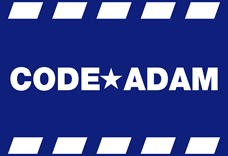Code Adam
This article needs additional citations for verification. (July 2009) (Learn how and when to remove this template message) |
Code Adam is a missing-child safety program in the United States and Canada, originally created by Walmart retail stores in 1994.[1] This type of alert is generally regarded as having been named in memory of Adam Walsh,[2] the 6-year-old son of John Walsh (the host of Fox's America's Most Wanted).
Adam was abducted from a Sears department store in Hollywood, Florida in 1981.[3] A search was undertaken by Adam's mother, grandmother, and store employees, and public address calls were made for him every 10 to 15 minutes. After approximately 90 minutes of fruitless searching, local law enforcement was called. Sixteen days later, Adam's severed head was found; his body was never recovered.
Today, many department stores, retail shops, shopping malls, supermarkets, amusement parks, hospitals, and museums participate in the Code Adam program. Legislation enacted by Congress in 2003 now mandates that all federal office buildings and PXs on military bases adopt the program.[4] Walmart, along with the National Center for Missing & Exploited Children (NCMEC) and the departments of several state Attorneys General, has offered to assist in training workshops in order for other companies to implement the program.
Process[edit]
Companies that do implement the program generally place a Code Adam decal at the front of the business. Employees at these businesses are trained to take the following six steps, according to the National Center for Missing & Exploited Children:
- If a visitor reports a child is missing, a detailed description of the child and what he or she is wearing is obtained. Specifically, what color and type of shoes the child is wearing (in department stores it's easy to change a child's clothes, harder to find different shoes) Additionally, all exterior access to the building is locked and monitored; anyone approaching a door is turned away. The child's name is not requested and is to be ignored if provided.
- The employee goes to the nearest in-house telephone and pages Code Adam, describing the child's physical features and clothing. As designated employees monitor front entrances, other employees begin looking for the child.
- If the child is not found within 10 minutes, law enforcement is called.
- If the child is found and appears to have been lost and unharmed, the child is reunited with the searching family member.
- If the child is found accompanied by someone other than a parent or legal guardian, reasonable efforts to delay their departure will be used without putting the child, staff, or visitors at risk. Law enforcement will be notified and given details about the person accompanying the child.
- The Code Adam page will be canceled after the child is found or law enforcement arrives.[5]
See also[edit]
References[edit]
- ^ "Code Adam". National Center for Missing & Exploited Children. Retrieved 13 July 2019.
- ^ Larson, Aaron (19 July 2016). "What are Amber Alerts and Code Adam Alerts". ExpertLaw. Retrieved 29 June 2017.
- ^ "When this boy was abducted from a mall, the crime became an all-time mystery". Miami Herald. 3 July 2016. Retrieved 29 June 2017.
- ^ "Code Adam Alert Program". GSA. U.S. General Services Administration. Retrieved 29 June 2017.
- ^ "Missingkids.com". Archived from the original on 2012-04-05. Retrieved 2008-04-23.
